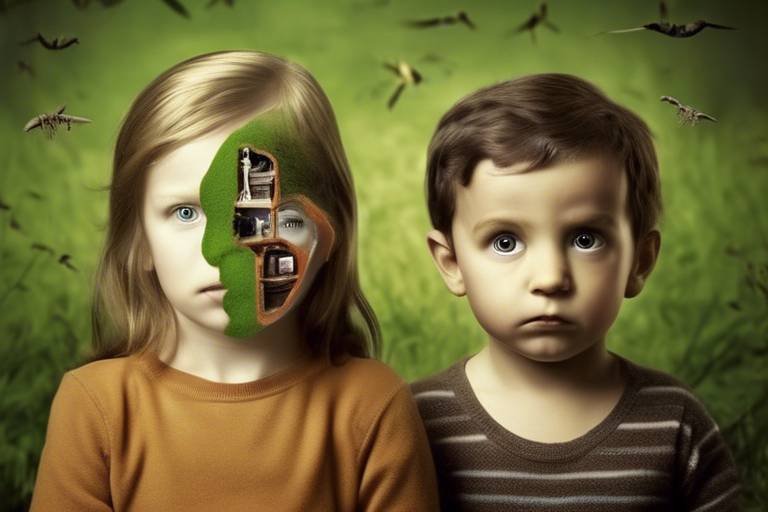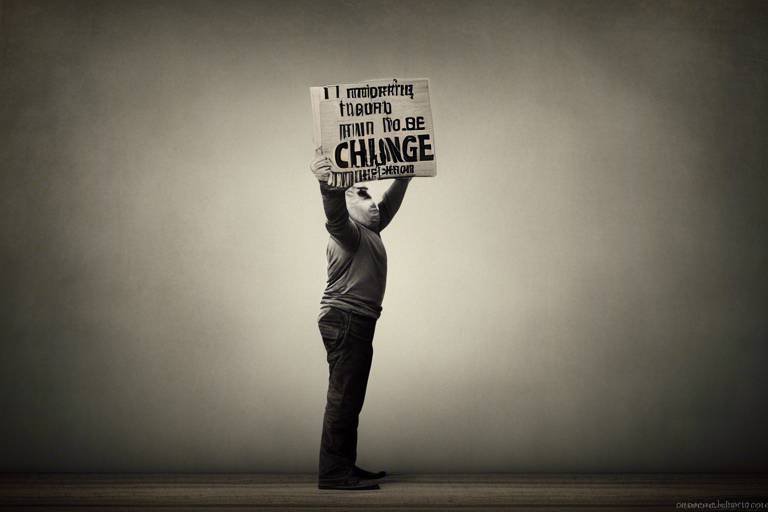The Nature vs. Nurture Debate - Philosophical Insights
The nature vs. nurture debate has captivated thinkers for centuries, igniting discussions about what shapes us as individuals. Are we merely products of our genetics, or do our experiences and environments play a pivotal role in our development? This question is not just an academic exercise; it resonates deeply with our understanding of human behavior, personality, and intelligence. As we delve into this topic, we unravel layers of complexity that challenge our perceptions of free will, identity, and the essence of being human.
At its core, the debate juxtaposes innate qualities—traits and tendencies we inherit biologically—with learned behaviors that arise from our surroundings. Imagine a seed planted in two different gardens: one is rich with nutrients, sunlight, and care, while the other is barren and neglected. The outcome of that seed’s growth is influenced not just by its genetic makeup but also by the environment in which it is nurtured. Similarly, our lives unfold through a dynamic interplay of both nature and nurture, making it essential to explore how these forces shape who we are.
Throughout history, philosophers and scientists have sought to understand this intricate relationship. From ancient thinkers to modern psychologists, each has contributed to the evolving narrative of human development. As we navigate through these perspectives, we will uncover how our understanding of nature and nurture has transformed over time, revealing profound implications for education, psychology, and even public policy.
In the sections that follow, we will explore historical insights, key philosophical perspectives, and the roles of biological and environmental factors. We will also address the implications of these views on contemporary society, ultimately enriching our grasp of what it means to be human in a world where both nature and nurture play significant roles.
Understanding the origins of the nature vs. nurture debate provides context for its evolution. This section examines early philosophical thoughts and scientific discoveries that laid the groundwork for contemporary discussions.
Various philosophers have contributed to the nature vs. nurture debate. This section outlines major viewpoints, including those of John Locke, René Descartes, and more modern theorists who shaped the discourse.
John Locke's concept of the mind as a blank slate emphasizes the role of experience in shaping individuals. This subheading discusses the implications of this theory for understanding human development.
Despite its influence, Locke's idea has faced criticism. This section explores arguments against the notion of a completely blank slate, highlighting evidence for innate qualities.
Contemporary thinkers have reinterpreted Locke's ideas, integrating findings from psychology and genetics. This part discusses how modern perspectives blend nature and nurture in understanding human behavior.
Biological determinism posits that genetics significantly influence behavior. This section examines the implications of this view and its critiques, considering the balance between biology and environment.
Environmental factors play a crucial role in shaping individuals. This section discusses how upbringing, culture, and social interactions contribute to personality and behavior, emphasizing the nurture aspect.
Parenting styles significantly impact child development. This subheading explores different approaches to parenting and their effects on personality formation and behavioral outcomes.
Culture shapes values, beliefs, and behaviors. This section delves into how cultural context influences individual development, highlighting the importance of nurture in the nature vs. nurture debate.
- What is the nature vs. nurture debate? The nature vs. nurture debate discusses the extent to which our genetics (nature) and our environment (nurture) influence our behavior and personality.
- Who were the key philosophers in this debate? Key philosophers include John Locke, who proposed the idea of the mind as a blank slate, and René Descartes, who emphasized innate ideas.
- How do modern perspectives view the debate? Modern perspectives often integrate both nature and nurture, recognizing that human behavior results from a complex interplay between genetic and environmental factors.
- Can parenting styles affect a child's development? Yes, different parenting styles can significantly impact a child's personality, behavior, and overall development.

[Historical Background]
The nature vs. nurture debate has been a pivotal topic in understanding human behavior, personality, and intelligence for centuries. Its origins can be traced back to ancient philosophical inquiries, where thinkers pondered the influences of genetics and environment on human development. This debate gained momentum during the Enlightenment period, with philosophers like John Locke and René Descartes offering contrasting views on the matter. Locke's idea of the mind as a tabula rasa, or blank slate, suggested that individuals are shaped primarily by their experiences, while Descartes argued for the existence of innate ideas, implying that some aspects of human behavior are pre-determined by our biology.
The 19th and 20th centuries saw significant advancements in both philosophy and science, further complicating the debate. The rise of evolutionary theory, particularly through the work of Charles Darwin, introduced the concept of natural selection, suggesting that certain traits may be inherited and advantageous for survival. This scientific perspective began to challenge the notion that human behavior was solely a product of environmental influences. As psychology emerged as a discipline, researchers like Sigmund Freud and later B.F. Skinner examined the interplay of inherited traits and environmental factors, leading to a more nuanced understanding of human behavior.
Throughout the 20th century, the debate continued to evolve, with the advent of genetics and neuroscience providing new insights. The discovery of DNA and the mapping of the human genome have opened up discussions about the extent to which our genes dictate who we are. Meanwhile, the field of psychology has emphasized the importance of context, suggesting that our surroundings and experiences play a crucial role in shaping our identities.
In summary, the historical background of the nature vs. nurture debate reveals a rich tapestry of philosophical thought and scientific discovery. As we continue to explore this complex interplay, it becomes increasingly clear that understanding human development requires a holistic approach that considers both genetic predispositions and environmental influences.

[Key Philosophical Perspectives]
The nature vs. nurture debate has captivated thinkers for centuries, leading to a rich tapestry of philosophical perspectives that seek to unravel the complexities of human behavior. At the heart of this discourse are several key figures whose ideas have profoundly influenced our understanding of how genetics and environment interact in shaping who we are. Each philosopher brings a unique lens through which we can examine the intricate dance between our biological makeup and the world around us.
One of the earliest and most influential contributors to this debate is John Locke. He proposed the idea of Tabula Rasa, or the "blank slate," suggesting that individuals are born without innate ideas and that all knowledge comes from experience. This perspective emphasizes the role of environmental factors in human development, positing that our experiences, education, and social interactions mold our personalities and intelligence. Locke's theory implies that if we could provide the right experiences, we could shape individuals into virtuous and knowledgeable beings, thereby placing immense responsibility on society to create nurturing environments.
In contrast, René Descartes offered a different viewpoint with his notion of innate ideas, suggesting that certain concepts are hardwired into our minds from birth. This perspective leans towards the idea of biological determinism, where genetics play a crucial role in determining our thoughts and behaviors. Descartes' ideas challenge Locke's emphasis on nurture, raising questions about the extent to which our genetic predispositions influence our development. Are we merely products of our environment, or do we carry within us the seeds of our future selves?
Modern philosophers and psychologists have further expanded this debate, integrating findings from genetics and neuroscience. For instance, the work of behavioral geneticists has shown that while genetics play a significant role in traits such as intelligence and personality, environmental factors cannot be overlooked. They argue for a more nuanced understanding that combines both nature and nurture. This has led to the emergence of theories that explore the interaction between genetic predispositions and environmental influences, suggesting that our development is a dynamic process shaped by both our biology and our experiences.
To illustrate these key philosophical perspectives, consider the following table that summarizes the main ideas:
| Philosopher | Key Idea | Implications |
|---|---|---|
| John Locke | Tabula Rasa (Blank Slate) | Emphasizes the role of experience and environment in shaping the individual. |
| René Descartes | Innate Ideas | Suggests that some ideas and traits are inherent and not solely shaped by experience. |
| Modern Theorists | Interaction of Nature and Nurture | Advocates for a blended approach recognizing the influence of both genetics and environment. |
As we navigate through these philosophical perspectives, it becomes evident that the nature vs. nurture debate is not a binary choice but rather a complex interplay of various factors. Each viewpoint offers valuable insights, encouraging us to explore the depths of human behavior and the myriad influences that shape our lives. Understanding these perspectives not only enriches our knowledge but also informs our approach to education, parenting, and societal development.

[Locke's Tabula Rasa]
John Locke, a prominent 17th-century philosopher, introduced the revolutionary idea of Tabula Rasa, which translates to "blank slate." This concept suggests that individuals are born without built-in mental content; rather, they acquire knowledge and personality traits through experience and sensory perception. Imagine a brand new canvas, untouched and waiting for the artist's brush—this is how Locke envisioned the human mind at birth. He argued that everything we are, from our thoughts to our behaviors, is influenced by our environment and experiences, rather than innate qualities.
Locke's theory was groundbreaking for his time, challenging the prevailing notions of innate ideas, which suggested that humans are born with certain knowledge or traits. Instead, he posited that our understanding of the world is shaped by our interactions with it. This perspective opened the door to a myriad of discussions regarding education, morality, and personal development. For instance, if a child is exposed to a nurturing environment, they are likely to develop positive traits such as empathy and kindness. Conversely, a harsh upbringing could lead to negative behaviors, such as aggression or distrust.
Locke's emphasis on experience raises significant questions about the role of education in shaping individuals. If we consider the mind as a blank slate, then education becomes a powerful tool in determining who we become. This leads to an intriguing debate: Can we truly mold a person into anything we desire through proper education and experience? Or are there limits to this malleability due to inherent traits? These questions remain central to contemporary discussions in psychology and philosophy.
Moreover, Locke's theory has important implications for societal structures and policies. If we accept that individuals are shaped by their environments, it follows that improving social conditions could lead to better outcomes for future generations. This idea has fueled movements aimed at reforming education systems, advocating for better parenting strategies, and addressing social inequalities. In essence, Locke's Tabula Rasa not only influences individual development but also has the potential to reshape communities.
However, while Locke's ideas were revolutionary, they are not without their critics. Many argue that Locke's view oversimplifies the complexity of human behavior. For example, research in psychology and neuroscience suggests that genetic predispositions can significantly influence personality traits and cognitive abilities. This brings us to the ongoing discussion of nature versus nurture, where the interplay between genetics and environment creates a rich tapestry of human experience.
In conclusion, Locke's Tabula Rasa invites us to contemplate the profound impact of our environments on our development. It challenges us to consider how much of who we are is a product of our experiences versus our genetic makeup. As we delve deeper into the nature versus nurture debate, Locke's philosophy continues to be a pivotal reference point, reminding us that we are all, in many ways, shaped by the world around us.

[Critiques of Tabula Rasa]
While John Locke's concept of Tabula Rasa, or the idea that the mind is a blank slate at birth, has been influential in shaping our understanding of human development, it has also faced significant criticism. One of the primary critiques is that this theory overlooks the impact of innate qualities and genetic predispositions. Research in genetics and psychology suggests that individuals are born with certain traits that can influence their behavior and personality, challenging the notion that all characteristics are solely shaped by experience.
For instance, studies have shown that temperament can be observed in infants, indicating that some aspects of personality are present from birth. This raises the question: if we are truly blank slates, why do some children display distinct personalities even in early childhood? Critics argue that Locke's theory simplifies the complex interplay between genetics and environment, suggesting that it is not merely a matter of nurture alone.
Another critique comes from the field of behavioral genetics, which examines how genes and environment interact to shape behavior. Research indicates that genetic factors can account for a significant portion of individual differences in traits such as intelligence, aggression, and even susceptibility to mental health issues. A study published in the journal Nature found that genetic factors could explain approximately 50% of the variance in intelligence among individuals. This data implies that while experiences undoubtedly shape us, our genetic makeup plays a crucial role that cannot be ignored.
Furthermore, the critique extends to the implications of ignoring biological factors in education and social policy. If we accept the idea of Tabula Rasa, we might assume that all children can achieve the same outcomes given the right environmental conditions. However, this perspective can lead to unrealistic expectations and policies that fail to account for the diversity of human potential. For example, children with learning disabilities may require tailored educational approaches that recognize their unique challenges rather than a one-size-fits-all strategy.
In summary, while Locke's Tabula Rasa offers a compelling framework for understanding the significance of experience in shaping individuals, it falls short by neglecting the powerful influence of genetics. The ongoing debate encourages a more nuanced view that recognizes the complex interplay between nature and nurture, ultimately leading to a deeper understanding of human behavior and development.

[Modern Interpretations]
In today's rapidly evolving world, the nature vs. nurture debate has taken on new dimensions, thanks to groundbreaking research in psychology, genetics, and neuroscience. Modern thinkers have begun to view the interplay between genetic predispositions and environmental influences as a dynamic and complex relationship rather than an either-or scenario. This shift in perspective emphasizes that while our genes may set the stage, it is our experiences that ultimately shape the performance of our genetic script.
For instance, contemporary studies in epigenetics reveal that environmental factors can actually influence gene expression. This means that our surroundings, lifestyle choices, and even our relationships can turn certain genes on or off, affecting how we develop. Imagine your genes as a musical score; the environment is the conductor that brings the music to life. Without the conductor's guidance, the score remains silent, but with the right cues, it can become a symphony of human experience.
Moreover, modern interpretations also recognize the importance of neuroplasticity, which refers to the brain's ability to reorganize itself in response to learning and experience. This concept challenges the notion that our personalities and intelligence are fixed traits determined solely at birth. Instead, it suggests that we have the power to reshape our neural pathways through our actions and choices. This idea is empowering, as it implies that we can actively influence our development throughout our lives.
Additionally, researchers have begun to integrate findings from various disciplines, such as sociology and anthropology, to create a more holistic understanding of human behavior. This interdisciplinary approach allows for a richer exploration of how factors like culture, upbringing, and social interactions contribute to our identities. For example, a child raised in a nurturing environment with supportive relationships is likely to develop different traits compared to one who faces adversity. This highlights the significance of the nurture aspect in shaping human behavior.
In summary, modern interpretations of the nature vs. nurture debate advocate for a blended perspective that appreciates the significance of both genetic and environmental factors. By acknowledging that our development is influenced by a myriad of elements, we can better understand the complexities of human behavior and personality. This nuanced view not only enriches philosophical discourse but also has practical implications for fields such as education, psychology, and public policy.
- What is the nature vs. nurture debate? The nature vs. nurture debate explores the relative contributions of genetic inheritance (nature) and environmental factors (nurture) to human development.
- How do modern interpretations differ from traditional views? Modern interpretations emphasize the interaction between genetic predispositions and environmental influences, recognizing that both play crucial roles in shaping behavior and personality.
- What role does epigenetics play in this debate? Epigenetics studies how environmental factors can affect gene expression, suggesting that our experiences can influence our genetic makeup.
- Can individuals change their behavior based on their environment? Yes, neuroplasticity indicates that individuals can reshape their behaviors and thought patterns through new experiences and learning.

[Biological Determinism]
Biological determinism is a fascinating and often contentious theory that suggests our genes play a pivotal role in determining our behavior, personality, and even our intelligence. Imagine for a moment that your DNA is like a blueprint for a house; it outlines the structure and design, but it doesn’t dictate the final look. Similarly, biological determinism posits that while our genetic makeup sets certain parameters, it doesn’t entirely control who we become. This theory has gained traction over the years, especially with advancements in genetics and neuroscience, leading many to ponder just how much of our behavior is preordained by our biology.
At its core, biological determinism argues that our traits—ranging from susceptibility to mental health issues to tendencies in aggressive behavior—are largely influenced by our genetic code. For instance, studies have shown that certain personality traits, such as extroversion or introversion, can have a heritable component. But does this mean we are mere puppets of our genes? Not necessarily. While genetics may set the stage, the environment often plays a crucial role in how these traits manifest. It’s like having a great script for a play; without a skilled cast and crew, the performance may fall flat.
Critics of biological determinism argue that it oversimplifies the complex interplay between genetics and environment. They assert that it can lead to a dangerous mindset, suggesting that individuals have little control over their actions or destinies. This perspective can be particularly problematic in discussions around social issues, such as crime or mental illness, where attributing behavior solely to biology can undermine the importance of social context, personal choices, and environmental influences.
Moreover, the debate extends into ethical considerations. If we accept biological determinism, what implications does that have for accountability? Should individuals be held responsible for actions that are, in part, influenced by their genetic makeup? Such questions challenge our understanding of free will and moral responsibility, stirring up philosophical conversations that have persisted for centuries.
To further illustrate the nuances of biological determinism, consider the following table that contrasts key aspects of the theory with opposing views:
| Aspect | Biological Determinism | Environmental Influence |
|---|---|---|
| Definition | Behavior is largely determined by genetic factors. | Behavior is shaped by environmental factors and experiences. |
| Key Focus | Genetics and heredity. | Upbringing, culture, and social interactions. |
| Implications | May lead to fatalism regarding behavior. | Emphasizes personal agency and responsibility. |
In conclusion, while biological determinism offers intriguing insights into how our genes may influence our behaviors, it is essential to recognize the significant role that environmental factors play. The interplay between nature and nurture is complex, and understanding this relationship can help us appreciate the full spectrum of human development. As we continue to explore these themes, it becomes clear that neither side of the debate holds all the answers, and perhaps, the truth lies somewhere in between.
- What is biological determinism? Biological determinism is the theory that genetics significantly influence behavior and personality traits.
- How does biological determinism differ from environmentalism? Biological determinism focuses on genetic factors, while environmentalism emphasizes the impact of upbringing and social context.
- Can behavior be changed if it is genetically influenced? Yes, while genetics may set certain predispositions, environmental factors and personal choices can lead to behavioral changes.

[The Role of Environment]
When it comes to understanding human behavior, personality, and intelligence, the environment plays an indispensable role. It’s like the canvas on which our genetic predispositions paint their masterpiece. Imagine a seed planted in different soils; the same seed can grow into a towering tree or a stunted shrub depending on the conditions surrounding it. This analogy beautifully encapsulates how our upbringing, culture, and social interactions shape who we become.
From the moment we are born, we are immersed in a world filled with influences that mold our identities. Our families, communities, and cultures provide the initial frameworks through which we view the world. For instance, children raised in nurturing environments tend to develop stronger emotional intelligence and resilience compared to those who grow up in neglectful settings. This emphasizes the importance of a supportive environment in fostering healthy development.
Furthermore, the role of education cannot be overstated. Schools are not just institutions for academic learning; they are social arenas where children learn to navigate relationships, develop critical thinking skills, and understand societal norms. The quality of education and the values instilled by educators significantly impact a child's future opportunities and perspectives. In fact, research has shown that students from enriched educational backgrounds often outperform their peers in various life aspects, including career success and personal fulfillment.
Moreover, cultural context plays a pivotal role in shaping our values and beliefs. Different cultures prioritize various traits, such as collectivism versus individualism, which can lead to distinct behavioral patterns. For instance, in collectivist societies, individuals may prioritize group harmony and familial loyalty, while in individualistic societies, personal achievement and independence might take precedence. This cultural backdrop influences everything from career choices to interpersonal relationships.
To further illustrate the environmental impact, consider the following table that outlines various environmental factors and their potential influences on individual development:
| Environmental Factor | Potential Influence |
|---|---|
| Parenting Style | Shapes emotional security and social skills |
| Education System | Affects cognitive development and career opportunities |
| Socioeconomic Status | Determines access to resources and opportunities |
| Cultural Norms | Influences values, beliefs, and behaviors |
Additionally, social interactions play a crucial role in shaping our identities. Friendships, peer groups, and community engagement provide essential feedback loops that influence our self-perception and behavior. For example, a supportive friend group can bolster self-esteem and encourage positive behaviors, while a toxic environment can lead to detrimental outcomes. It’s fascinating how the people we surround ourselves with can either uplift us or drag us down, highlighting the profound impact of social dynamics.
In conclusion, while our genetic makeup sets the stage for potential, it is the environment that truly directs the performance. The interplay between nature and nurture is complex and multifaceted, but one thing is clear: the environment is a powerful force in shaping who we are. Understanding this relationship can lead to better strategies for fostering healthy development in individuals, ultimately paving the way for a more empathetic and understanding society.
- What is the nature vs. nurture debate? The nature vs. nurture debate centers around whether human behavior is determined by genetics (nature) or environment (nurture).
- How does parenting influence child development? Parenting styles can significantly impact emotional security, social skills, and overall personality development in children.
- Can culture affect behavior? Yes, cultural norms and values can shape beliefs and behaviors, influencing how individuals interact with the world.
- What role does education play in shaping personality? Education provides not only academic knowledge but also social skills and critical thinking abilities that are essential for personal growth.

[Influence of Parenting]
When we talk about the influence of parenting, we're diving deep into the heart of human development. Think about it: from the moment we're born, the way our parents interact with us shapes our personalities, beliefs, and behaviors. It's like planting a seed in a garden; the care and attention it receives will determine how it grows. Different parenting styles can lead to vastly different outcomes in children, and understanding these styles can reveal much about the nature vs. nurture debate.
Research has shown that there are primarily four recognized parenting styles: authoritative, authoritarian, permissive, and neglectful. Each of these styles comes with its own set of expectations and outcomes. For instance, authoritative parents, who are both responsive and demanding, tend to raise children who are more socially competent and self-reliant. In contrast, authoritarian parents, who are strict and expect obedience, may raise children who are less independent and more anxious.
| Parenting Style | Characteristics | Potential Outcomes |
|---|---|---|
| Authoritative | Warm, responsive, and demanding | Socially competent, self-reliant |
| Authoritarian | Strict, expects obedience | Less independent, more anxious |
| Permissive | Lenient, indulgent | Impulsive, lack of self-discipline |
| Neglectful | Uninvolved, indifferent | Low self-esteem, poor social skills |
It's fascinating how these styles can impact a child's development. For instance, children raised by authoritative parents often display higher academic performance and better emotional regulation. They learn to navigate the world with a sense of confidence and resilience. On the other hand, those who experience neglectful parenting might struggle with forming healthy relationships and exhibit behavioral issues. This discrepancy highlights the profound effect that parenting has on shaping not just behavior, but also emotional and psychological health.
Moreover, the cultural context plays a significant role in how parenting styles manifest. In some cultures, collectivist values may promote a more authoritarian approach, emphasizing obedience and respect for authority. In contrast, cultures that value individualism might lean towards more permissive or authoritative styles, promoting independence and self-expression. This cultural lens adds another layer to the nature vs. nurture debate, illustrating that parenting is not just about individual choices but also about broader societal influences.
Ultimately, the influence of parenting is a powerful testament to the nurture side of the equation. While genetics may lay the groundwork for certain traits, it is the nurturing environment—especially the parenting style—that can either bolster or hinder a child's development. This interplay between nature and nurture is complex, but one thing is clear: the role of parents in shaping who we become is irrefutable.
- What is the most effective parenting style?
The authoritative style is often considered the most effective, as it balances responsiveness with expectations, fostering independence and social competence. - Can parenting styles change over time?
Yes, parents can adapt their styles based on their children's needs and circumstances, and it's common for styles to evolve as children grow. - How does culture influence parenting?
Cultural values shape parenting practices, with some cultures emphasizing obedience and others promoting independence and self-expression.

[Cultural Impact]
The impact of culture on individual development cannot be overstated. Culture acts like the invisible hand that shapes our thoughts, behaviors, and values from the moment we are born. Imagine a seed planted in different types of soil; the nutrients and conditions of the soil will determine how that seed grows. In the same way, our cultural environment influences our growth and development, affecting everything from our communication styles to our moral beliefs.
Culture encompasses a wide array of components, including traditions, languages, social norms, and shared experiences. These elements collectively create a framework within which individuals navigate their lives. For instance, a child raised in a collectivist culture, where community and family are prioritized, may develop a strong sense of interdependence and cooperation. In contrast, a child from an individualistic culture may be encouraged to pursue personal goals and independence. This divergence highlights how culture can shape not only personality traits but also life choices and aspirations.
Moreover, the influence of culture extends beyond childhood. As we grow, we encounter various cultural narratives that further refine our identities. For example, consider how media representation can affect self-esteem and aspirations. A young girl who sees strong female characters in her cultural narratives is likely to feel empowered to pursue leadership roles, whereas a lack of representation may lead to feelings of inadequacy or self-doubt. This phenomenon illustrates how cultural context can significantly impact one's perception of self and the world.
Additionally, cultural impact is evident in the way we express emotions and communicate. In some cultures, expressing emotions openly is encouraged, while in others, restraint is valued. These differences can lead to misunderstandings in cross-cultural interactions. For example, a person from a culture that values emotional expressiveness may perceive someone from a more reserved culture as cold or indifferent, while the latter may view the former as overly dramatic. Such cultural nuances in communication can lead to both enriching exchanges and significant misinterpretations.
Furthermore, cultural practices and rituals play a pivotal role in shaping behavior and social interactions. Take, for instance, the different approaches to education across cultures. In some societies, rote memorization is emphasized, while others prioritize critical thinking and creativity. These educational philosophies not only influence academic performance but also shape how individuals approach problem-solving and innovation throughout their lives.
To illustrate the diverse impacts of culture, consider the following table that outlines various cultural dimensions and their implications on individual behavior:
| Cultural Dimension | Description | Behavioral Implications |
|---|---|---|
| Individualism vs. Collectivism | Focus on personal goals vs. group goals | Self-reliance vs. community support |
| High-context vs. Low-context Communication | Reliance on non-verbal cues vs. direct communication | Subtlety vs. clarity in interactions |
| Power Distance | Acceptance of unequal power distribution | Respect for authority vs. questioning hierarchy |
| Uncertainty Avoidance | Comfort with ambiguity | Preference for rules vs. flexibility |
In conclusion, the cultural context in which we are raised plays a crucial role in shaping our identities and behaviors. It influences our values, communication styles, and even our aspirations. Recognizing the profound impact of culture allows us to appreciate the rich tapestry of human experience and understand that our differences are not just personal quirks but reflections of the diverse environments from which we come.
- How does culture influence personality development?
Cultural norms and values shape our behaviors, beliefs, and interactions, which in turn influence our personality traits. - Can individuals change their cultural influences?
Yes, individuals can adapt to new cultures, especially when exposed to different environments or communities. - What role does culture play in education?
Culture impacts educational philosophies, teaching methods, and learning styles, affecting how knowledge is acquired and valued. - How can understanding cultural impacts improve communication?
Awareness of cultural differences in communication styles can help reduce misunderstandings and foster better relationships.
Frequently Asked Questions
- What is the nature vs. nurture debate?
The nature vs. nurture debate examines the extent to which our genetics (nature) or our environment (nurture) shapes who we are. It’s a classic discussion in psychology, philosophy, and biology, exploring how much of our behavior, personality, and intelligence is influenced by inherited traits versus life experiences.
- Who were the key philosophers involved in this debate?
Several influential philosophers have contributed to the nature vs. nurture discussion. Notable figures include John Locke, who proposed the idea of the mind as a blank slate, and René Descartes, who emphasized innate ideas. Their perspectives have paved the way for modern theories that integrate both genetic and environmental factors.
- What is John Locke's concept of Tabula Rasa?
Locke's concept of Tabula Rasa suggests that individuals are born without built-in mental content, and all knowledge comes from experience or perception. This idea highlights the importance of environmental influences in shaping our thoughts and behaviors, suggesting that we are largely products of our surroundings.
- Are there critiques of the Tabula Rasa theory?
Yes, many critics argue that Locke's idea oversimplifies human development. They point to evidence of innate qualities and genetic predispositions that influence behavior, suggesting that while experience is crucial, biological factors also play a significant role in shaping who we are.
- How do modern interpretations view the nature vs. nurture debate?
Modern interpretations often blend the concepts of nature and nurture, recognizing that both genetics and environment interact in complex ways to influence human behavior. Contemporary research in psychology and genetics has shown that traits are often the result of both inherited qualities and life experiences.
- What is biological determinism?
Biological determinism is the idea that our genetics primarily dictate our behaviors and traits. While this perspective emphasizes the role of biology, it has faced criticism for downplaying the significant impact of environmental factors and social contexts in shaping human behavior.
- How does the environment influence personality and behavior?
The environment plays a critical role in shaping who we are. Factors such as upbringing, culture, and social interactions contribute to our personality development. For instance, children raised in nurturing environments tend to develop more positive traits compared to those in neglectful settings.
- What impact does parenting have on child development?
Parenting styles can significantly affect a child's development. Different approaches, such as authoritative or permissive parenting, can lead to various behavioral outcomes, influencing a child's personality and social skills as they grow.
- How does culture shape individual development?
Cultural context is a powerful force in shaping values, beliefs, and behaviors. It influences everything from how we communicate to how we perceive success and relationships, underscoring the importance of nurture in the nature vs. nurture debate.



















